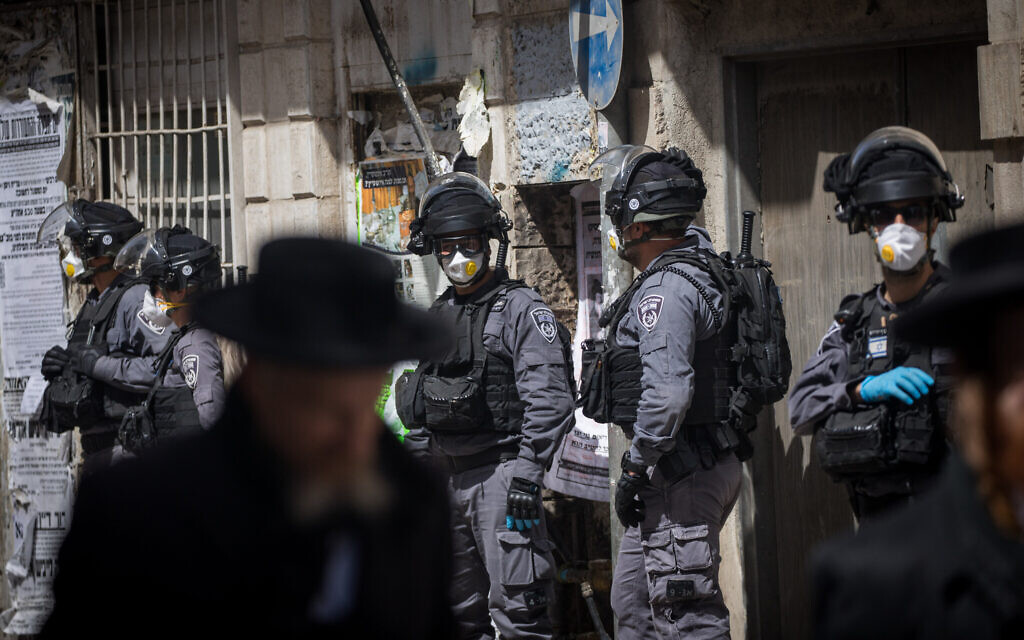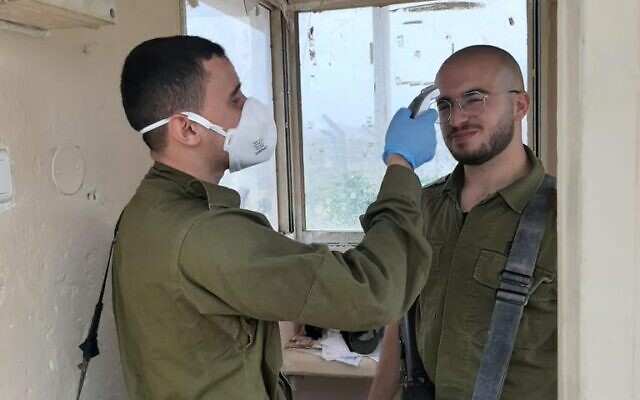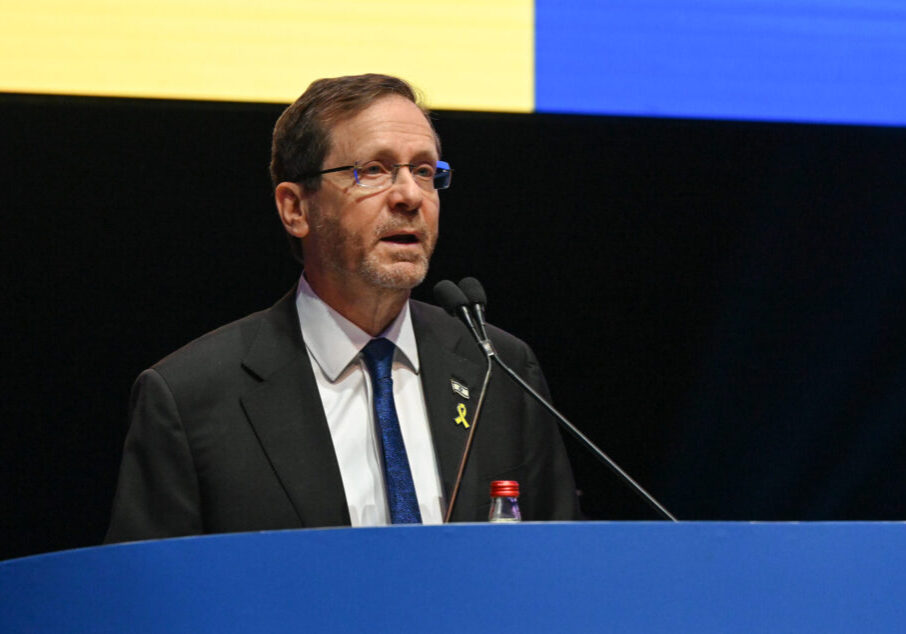Australia/Israel Review
A different sort of war
Mar 31, 2020 | Alex Fishman

The IDF and the battle against coronavirus
The Israeli military is preparing for the worst. Already by the last week of February, the “Summer Cage” program had been pulled out of the filing cabinets by the IDF’s Operations Department. This is a military plan to deal with a “severe national event” – such as a natural disaster like an earthquake, which causes cities to collapse, severe damage to energy infrastructure and of course, tens of thousands of casualties and fatalities.
The coronavirus crisis is a whole other story – something we haven’t seen before. It is not targeted at a particular area and threatens to harm all populations across the country. Therefore, teams have been working around the clock in the planning department of the operations division to adapt “Summer Cage” to an epidemic situation.
The defence forces, and the IDF in particular, have a key role to play in such national crises in Israel. At the present time, the military is mainly focused on assisting the civilian economy, but if the government declares a national emergency, it will become a major factor in addressing and managing the crisis. In the end, the security services are the largest and most organised body in the State of Israel, and there are tasks that only they can do.
Operating a modified “Summer Cage”, with all its implications, would require a government decision to implement emergency regulations that transfer military powers to areas designated as closed military territory.
Incidentally, the legal situation today states that the person in charge of a “civilian emergency”, if declared, is the Minister for Public Security, with the army subject to him. This promises conflict between Public Security Minister Gilad Erdan and Defence Minister Naftali Bennett.
Yet Prime Minister Binyamin Netanyahu, for his part, appears in no hurry to convene the government to implement the emergency regulations – except for an amendment that allows Israel’s General Security Service (GSS) and the police to monitor civilians.
For the time being, it is doubtful that anyone in the IDF General Staff believes that we will indeed reach full implementation of “Summer Cage”, that is, a situation in which the defence establishment takes responsibility for managing the crisis.
But the first phase of the program has already been activated.
The military’s ability to exert efforts to benefit the economy and civilian infrastructure is contingent on quiet on the borders, as “Summer Cage” requires a concerted effort by all Home Front Command units, including the operation of an IDF logistics envelope.
That includes: airlifting patients, mobilisation of the transport system (including buses), the establishment of evacuation and medical treatment centres and field hospitals, isolating infected areas, assisting local authorities with management, ensuring essential services to the home front, information and more.
Therefore, since late February, Israel has been sending a clear message to the players and countries in the region: We will not tolerate any provocation at the current time. Don’t test this. Any provocation will be answered with a disproportionate response.
At the same time, the Israeli Air Force continues to conduct regular flights over the region’s skies to make sure the message is understood. Hostile countries see the planes on their radar and should understand that Israel seriously intends to carry out the threat. The result, for now, is that the message appears to have been fully absorbed.
The Israeli threat may have worked, but the coronavirus crisis in neighbouring countries – notably Iran and Lebanon – is likely to have an effect too. Activities that are defined by Israel as “red lines” that require a counterterrorist response are hardly being seen. Relieving tension at the borders also includes lowering the level of friction in the West Bank. Arrest operations, for example, in the West Bank, are currently carried out mainly in urgent “ticking bomb” situations only.
Coronavirus and the regional situation
The first factor that initially brought the global coronavirus crisis to the consciousness of the IDF General Staff as a problem came out of the Intelligence Division.
Intelligence material coming from Lebanon and Iran showed a worsening crisis in these countries.
In Lebanon, this was demonstrated by the huge concern amongst Hezbollah officials, most notably the group’s leader, Hassan Nasrallah, in the face of the illness of members of the organisation returning from Iran.
In Iran, the epidemic has affected both daily life and the conduct of the Revolutionary Guard.
Thus, in the discussions held by the IDF Operations Division in mid-February, three factors that would influence the assessment of Israel’s security situation were flagged:
1. The Israeli elections in early March;
2. The harsh winter weather, potentially limiting the use of airpower; and
3. The coronavirus crisis.
At the end of February, the IDF defence attaché was recalled from China, and the true scale of the global epidemic began to seep into the military’s plans. The IDF Medical Corps went on alert. IDF medical practitioners – who began holding video conferences regularly with military medical allies to exchange information – began to understand the implications.
At the end of February, IDF Chief of Staff Aviv Kochavi issued a summary of the General Staff status, setting priorities for the military’s preparation for the coronavirus crisis:
1. Maintaining operational competence and readiness and especially the IDF’s functional continuity in the face of the danger of mass contagion within the military.
2. Reducing the rate of the virus’s spread in the IDF.
3. Providing assistance to the civilian population.
The Chief of Staff has tasked his deputy, Major General Eyal Zamir, with coordinating situation assessments within the army in the face of the coronavirus crisis, while the Chief of Operations, Major General Aaron Haliva, was placed in charge of planning and implementing the decisions arising from the new situation.
The Deputy Chief of Staff conducts daily status assessments with several partners; the Chief of Operations; the Planning Division chief, who oversees relations with neighbouring countries and with the world; the Head of the Technology and Logistics Division, who is in charge of the Medical Corps and Logistics Centres; and the Commander of the Home Front, who is tasked with assisting the civilian sector.
The first step taken to curb the spread of the epidemic within the IDF was to cut off military personnel from all parties outside Israel. In late February, two major joint exercises were cancelled: “Juniper Cobra,” an exercise that takes place once every two years with the US Central Command, and an extraordinary exercise in which a US paratroop brigade was to be deployed with the parachute units in the IDF.
Some of the American soldiers were supposed to come through Italy, but Israel required those coming from Italy to enter isolation.
An awkward situation occurred when, due to coronavirus restrictions, a meeting of Chief of Staff Kochavi and senior US officers, including four-star generals, who had come to Israel as part of the preparations for the exercises, could not go ahead.
At that time, there were no restrictions on behaviour in place for curbing the spread of coronavirus in the US. But the Chief of Staff realised by then that in order to maintain operational continuity, the senior officers must guard against risk of contagion.
If trips by military personnel abroad for exhibitions and conferences were initially cancelled, it was only in mid-March that the penny dropped about the severity of the situation, when a sweeping directive was issued prohibiting the departure of Israeli military personnel abroad for any reason, including for operational cooperation with other militaries.
The Chief of Staff himself had to cancel a planned work trip to the United States.
In addition, the routine of the General Staff has been changed in recent weeks. Meetings of generals and other senior officers have been reduced to small gatherings.
In the recent General Staff discussion, for example, some of the generals sat in eight different areas of the “Kirya” military headquarters and participated in the meeting via video conference.
The generals in charge of the Southern and Northern Command remained in their offices in Beer Sheva and Safed respectively.
Seder night operation
In order to maintain operational functionality in the army, the General Staff decided to radically alter working practices. Units began to function in shifts, with each shift never meeting or coming into contact with the shift that followed.

The IDF is testing and isolating soldiers – preparing for the likelihood that whole units will be taken out of action by the coronavirus
So if one of the soldiers on guard at a site comes down with coronavirus and the other soldiers on the same shift are put into isolation, another team can immediately go into operation.
This is true in the headquarters and it is also true for various operational units, including squadrons. Shifts do not meet other shifts.
In the Air Force, for example, reserve aircrews, who usually attend one-day training, will be housed for a full two weeks inside the base and not leave except for their flights. This substantially reduces the number of active pilots in the squadron. This also means that if a pilot gets sick and his unit needs to be quarantined, there are enough pilots to replace them without interrupting operations.
In the Navy, some of the ships have been sent for extended stays at sea so that they have no contact with anyone on land.
To ensure functional continuity in critical areas, the army has built another mechanism known as “capsules.” These are small groups of unique professionals in very critical areas of intelligence, the computer service directorate, the special forces, and the Navy and the Air Force.
These people have been moved to isolated places, completely cut off from the world.
Some of these personnel are capable of operating the systems they are in charge of in isolation, while others will be alerted when necessary to replace their counterparts who operate systems on a daily basis if they become infected.
For example, a submarine crew will be kept completely isolated from the world and will be alerted if there is a necessity to replace a crew that has become infected with the coronavirus.
The IDF also recently took another major step to reduce contact between the soldiers and the civilian population. All field unit soldiers, training programs and training units are required to remain at their bases for an indefinite period. Less vital soldiers have been sent home by the thousands.
Training programs have also been adjusted, while major exercises planned for the next six months have been postponed. The army is only fully training at the low tactical levels of brigade and below. All other training, at the battalion level or above, is done by a skeleton staff or as part of the headquarters training at the designated centre.
The army continues to recruit new soldiers, but all pre-military endurance training programs – to prepare for pilot courses, special forces entry, etc. – have been shut down. Soldiers involved in classroom studies will learn in classes of no more than 30 people.
Meanwhile, up to 100 soldiers are allowed to perform operations together in the open air. Junior commanders – platoon commanders and sergeants – lead the training.
In fact, the Chief of Staff declared 2020 as the year of improving the qualifications of junior tactical level commanders, so he can now fulfil that goal courtesy of the coronavirus.
These are just a few examples of the thousands of adjustments the Army has made to operate in the coronavirus era.
Holding such large numbers of soldiers in closed bases over time is a complex logistical challenge. It is difficult to feed tens of thousands of soldiers under the conditions of remoteness and isolation required by the Israeli Ministry of Health.
The annual Passover holiday seder dinner, with its logistical hardships, is already waiting in the wings, with Passover beginning on April 8. This requires the IDF logistical department to buy three times as much food as it originally planned.
The need to find places to make arrangements for Passover seders that accord with the Ministry of Health’s guidelines on large gatherings is also a logistical nightmare.
Not to mention the need to find accommodation solutions for soldiers who have so far had to stay at open-air bases, to provide suitable equipment, to adapt sanitation systems, to disinfect military buses after each use, to disinfect elevators and more.
Mobilising for disinfecting
As of mid-March, nine coronavirus patients had been identified in the army. About 4,700 uniform wearers were in isolation. However, no unit in the army was disabled.
There is a single case of a military research centre where 70% of its employees have had to go into isolation, but this has had no operational impact.

The IDF Medical Corps is moving to play a key role in disinfection efforts
However, at the top of the IDF there are no illusions: it is possible that whole battalions or more may be removed from an operational situation.
The Medical Corps received an immediate budget boost of NIS 20 million (A$9 million) to purchase protective equipment, respiratory systems and medicines to be used by the military, but also to assist the civilian sector if needed.
Hotels to Hospitals
At present, the IDF’s assistance to the civilian economy is a function of requests that reach the Ministry of Defence from the National Security Council (National Security Council head Meir Ben-Shabbat, acting on behalf of the Prime Minister, coordinates all the bodies and offices involved in management of the current crisis). But the Defence Minister is pushing the IDF to assist the civilian population even before it is asked.
From this, for example, was born the idea of turning civilian hotels into inpatient facilities for those infected with coronavirus. This stems from Bennett’s view that hospitals have no place to isolate the ill patients and they should be isolated from the other patients in the hospitals so as not to expand the circle of carriers.
The Ministry of Defence and the Home Front Command assumed responsibility for operating these facilities.
The Defence Minister also wants to increase the number of coronavirus test kits to enable testing of several thousand subjects a day. To this end, the Home Front Command and the Medical Corps began to purchase a large amount of test kits and additional equipment.
In addition, the Mossad intelligence agency had procured 100,000 test kits through dealing with an unnamed country with which Israel does not have official relations.
Prior to the outbreak of the crisis, the Ministry of Health held sufficient emergency equipment for only a month. It was only in February that a budget was approved to purchase equipment for three months, but it is estimated that this will not be enough, so the Ministry of Defence entered the picture.
At the same time, the IDF has promoted the establishment of a laboratory using the capabilities of the IDF Medical Corps to supplement the civilian laboratories that can detect coronavirus carriers.
As part of its collaboration with the NSC and the Ministry of Health, the Home Front Command has also deepened its presence in hospitals and is assisting them in establishing emergency systems. For this purpose, blood donation units have been recruited, and the Home Front Command’s medical units are getting training in coronavirus patient care.
Also, in discussions with the Ministry of Defence, the Home Front Command has formulated a plan to disinfect extensive areas, using means originally intended for clean up after chemical weapons attacks.
In addition, a focal point has been established in the Home Front Command to assist the information provision sections of the Ministry of Health and Magen David Adom (MDA), Israel’s national emergency medical service.
The army has also already mobilised a skeleton staff for its liaison units to assist local authorities. Their mission is to help the local authorities maintain a continuous functioning around the clock of key services such as garbage collection, assistance for the elderly and populations with special needs, distribution of food and medicine, volunteer work, etc. These bodies are already working alongside the municipalities to prepare for a situation where the pandemic will paralyse entire sectors of the economy.
The army is preparing for the battle against the coronavirus as if for a conventional war.
Alex Fishman is military affairs correspondent at the Israeli daily Yediot Ahronot. © Yediot Ahronot (www.ynet.co.il), reprinted by permission, all rights reserved. Translation by Ahron Shapiro.
Tags: IDF, Israel, coronavirus






